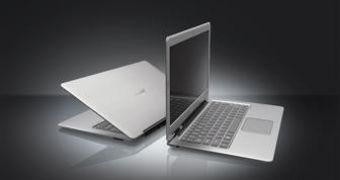Ultrabooks have been getting a lot of attention lately, but it has mostly been part of reports and such, so Intel decided to go official on some of the more important assets of these machines, as well as their effect on the market.
Ultrabooks were at least partially invented as a means to stave off the assault of the tablet market, but they are shaping up to be game changers in their own right.
Though they are still part of the notebook segment, they are significantly thinner than anything seen so far, among other things.
Previously, it wasn't easy to make a laptop that could actually perform well in such a form factor, not to mention last long enough on just the battery.
Now that CPUs, RAM and solid state drives significantly lowered the power draw levels, however, Ultrabooks have become a reality.
Intel also pointed out that such notebooks are secure and elegant, not just light and sleek, while not sacrificing performance.
All in all, Intel expects Ultrabooks to fundamentally change the PC market for the better, especially once the next batch of low-power CPUs arrive.
"Not since the introduction of Intel Centrino technology more than 8 years ago have we witnessed such a fundamental transformation of personal computing," said Mooly Eden, vice president and general manager of the PC Client Group, at the Intel Developer Forum.
"Today's devices powered by our 2nd generation Intel Core processors are giving people a personal computing experience that they've never had before and we won't stop there. We know people desire and demand more from their computers -- to create, consume and share -- which is why we have challenged ourselves and the industry to make Ultrabook the most adaptable, complete and satisfying device."
The only hiccup, so far, lies in the price (Acer's Ultrabook S3 retails for roughly $898, for instance), but Intel says the machines will sport mainstream prices when things really take off.

 14 DAY TRIAL //
14 DAY TRIAL //